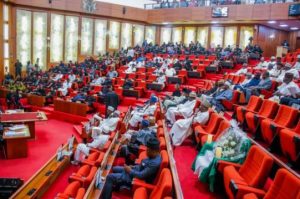
ELECTRIC VEHICLE TRANSITION BILL PASSES SECOND READING IN SENATE

By: Muftau Fatimo
The Nigerian Senate has passed the Electric Vehicle Transition and Green Mobility Bill 2025 for its second reading.
According to the media, the bill aims to establish a national framework to guide Nigeria’s shift to electric vehicles (EVs), encourage local manufacturing, and reinforce the country’s commitment to environmental sustainability.
Sponsored by Senator Orji Uzor Kalu (Abia North), the proposed legislation received widespread backing as lawmakers discussed strategies to advance electric mobility. Key areas highlighted include local content development, partnerships with foreign investors, and the creation of a nationwide EV charging infrastructure.
Leading the debate, Senator Orji Uzor Kalu said the Electric Vehicle Transition and Green Mobility Bill 2025 is designed to transform Nigeria’s automotive and energy sectors, drive innovation, and generate employment across the manufacturing value chain.
He explained that the bill offers tax holidays, import duty waivers, toll exemptions, subsidies, and road tax reliefs for EV users and investors. It also mandates the installation of charging stations at all fuel outlets nationwide.
A significant provision requires foreign automakers to collaborate with licensed Nigerian assemblers, establish local assembly plants within three years, and achieve at least 30 percent local content sourcing by 2030. Non-compliance could result in fines of up to ₦250 million per breach, while unlicensed EV importers risk fines of ₦500 million and confiscation of goods.
The bill also aims to position Nigeria as an EV manufacturing hub in Africa by requiring assemblers to produce a minimum of 5,000 units annually while meeting international safety and technical standards. Investors establishing charging stations would qualify for government grants and tax incentives.
Senate President Godswill Akpabio described the legislation as a forward-looking initiative aligned with President Bola Tinubu’s economic diversification and clean energy agenda. The bill has been referred to the Senate Committee on Industry for further review and is expected to return to the chamber within four weeks.
